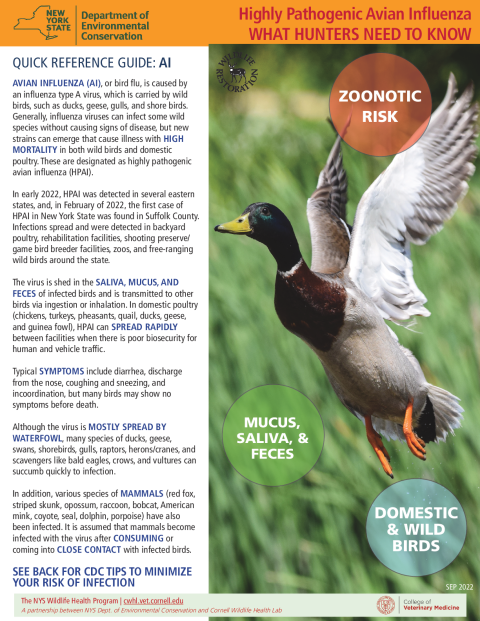AVIAN INFLUENZA (AI), or bird flu, is caused by an influenza type A virus, which is carried by wild birds, such as ducks, geese, gulls, and shore birds. Generally, influenza viruses can infect some wild species without causing signs of disease, but new strains can emerge that cause illness with HIGH MORTALITY in both wild birds and domestic poultry. These are designated as highly pathogenic avian influenza (HPAI).
In early 2022, HPAI was detected in several eastern states, and, in February of 2022, the first case of HPAI in New York State was found in Suffolk County. Infections spread and were detected in backyard poultry, rehabilitation facilities, shooting preserve/ game bird breeder facilities, zoos, and free-ranging wild birds around the state.
The virus is shed in the SALIVA, MUCUS, AND FECES of infected birds and is transmitted to other birds via ingestion or inhalation. In domestic poultry (chickens, turkeys, pheasants, quail, ducks, geese, and guinea fowl), HPAI can SPREAD RAPIDLY between facilities when there is poor biosecurity for human and vehicle traffic.
Typical SYMPTOMS include diarrhea, discharge from the nose, coughing and sneezing, and incoordination, but many birds may show no symptoms before death. Although the virus is MOSTLY SPREAD BY WATERFOWL, many species of ducks, geese, swans, shorebirds, gulls, raptors, herons/cranes, and scavengers like bald eagles, crows, and vultures can succumb quickly to infection.
In addition, various species of MAMMALS (red fox, striped skunk, opossum, raccoon, bobcat, American mink, coyote, seal, dolphin, porpoise) have also been infected. It is assumed that mammals become infected with the virus after CONSUMING or coming into CLOSE CONTACT with infected birds.
CDC Precautions
The Centers for Disease Control and Prevention (CDC) states that the recent HPAI detections in birds do not present an immediate public health concern. HPAI cases in humans are rare, and symptoms are typically mild. However, while the risk of a person becoming infected is low, hunters may be at higher risk from handling waterfowl.
To minimize your risk, follow the precautions listed below:
- Harvest only game that appears to be healthy.
- Do not handle sick game – report to your state wildlife agency.
- Use personal protective equipment (PPE) like masks, gloves, and eye protection when handling and cleaning game.
- Field dress game outdoors or in a well-ventilated area.
- Do not feed carcass parts to pets or leave behind for other wild animals to scavenge. Seal carcass and unwanted organs in plastic bags for disposal in trash.
- After handling game, wash your hands thoroughly, and clean and disinfect all equipment and surfaces that came into contact with game.
- Do not eat, drink, or smoke when handling game.
- Properly cook any game meat you eat to an internal temperature of 165° F to kill the virus.
Monitor your health for any signs of flu-like symptoms within a week of handling wild birds and consult your health care provider if you have any questions. Consider receiving seasonal influenza vaccines.
If you keep backyard poultry, be aware that the virus can be transported on hunting equipment and gear. Designated clothing used only for hunting that can be washed in hot water can help keep your flock healthy.
Report any suspect HPAI mortalities and sick birds to your regional DEC wildlife staff: https://www.dec.ny.gov/about/558.html.
To report dead wildlife to the DEC: https://www.dec.ny.gov/animals/6957.html.


